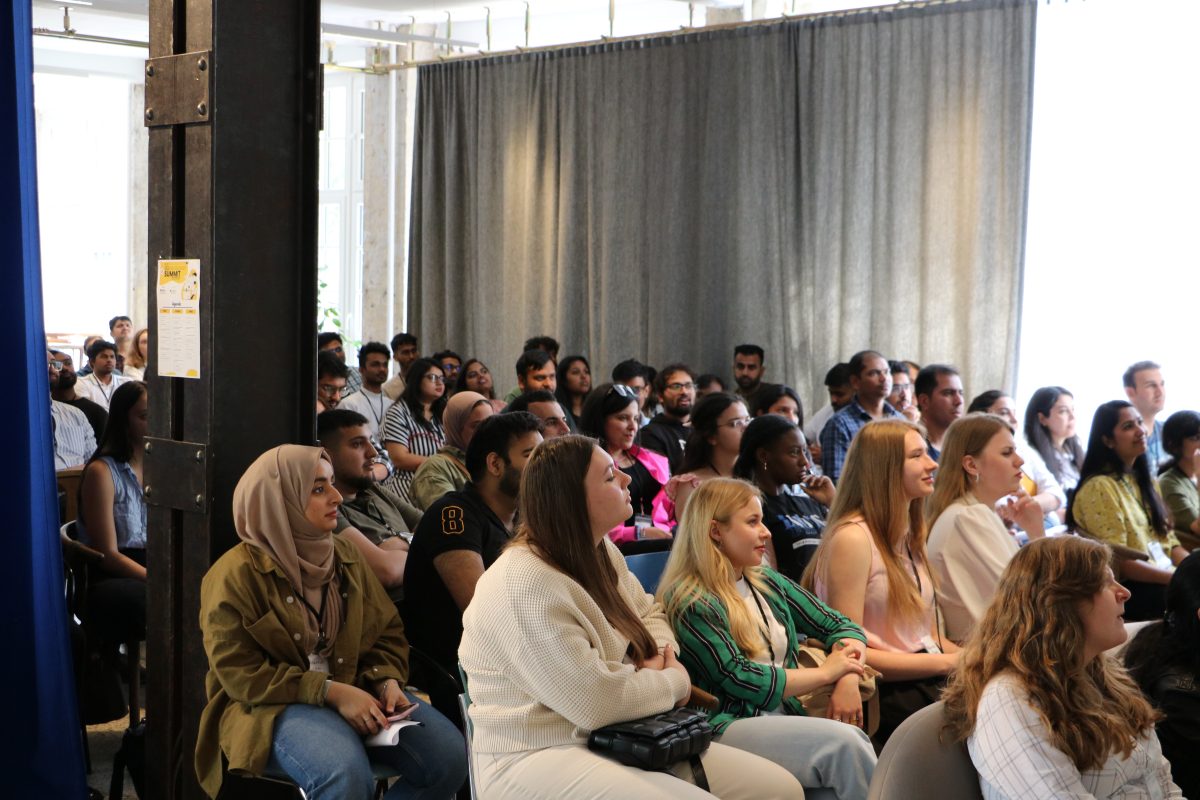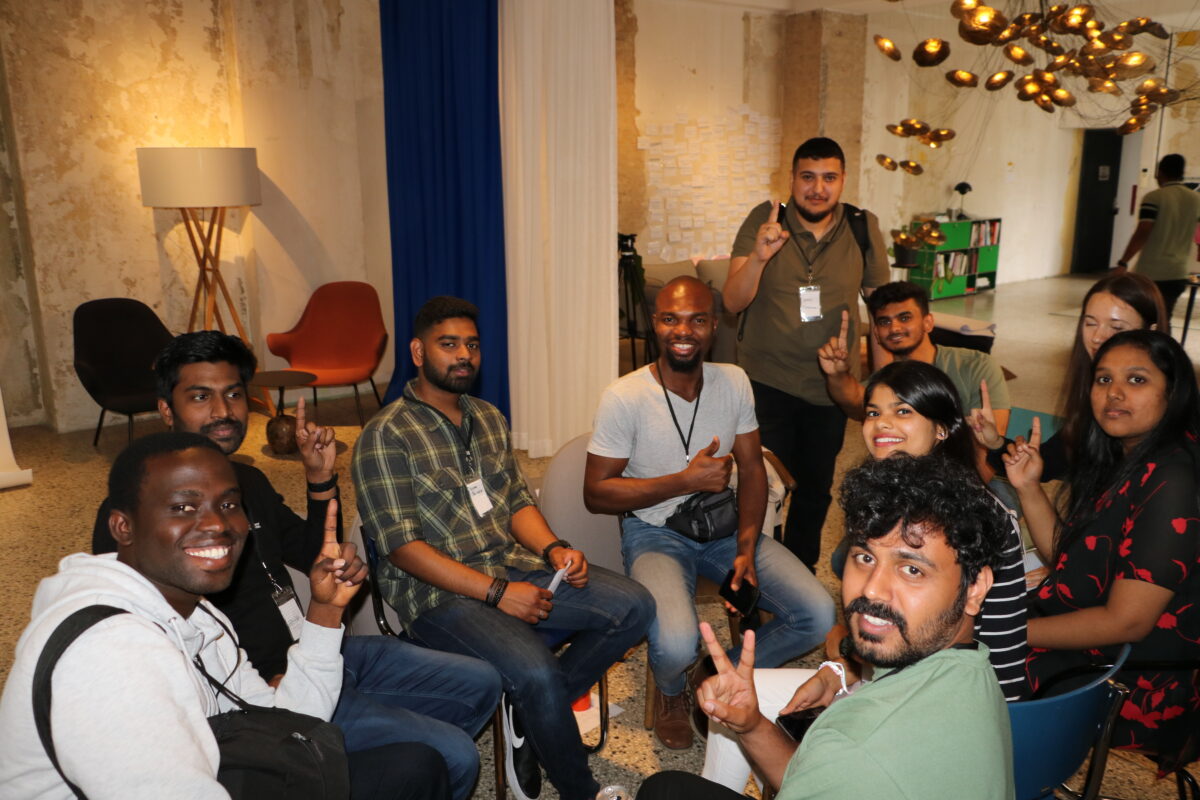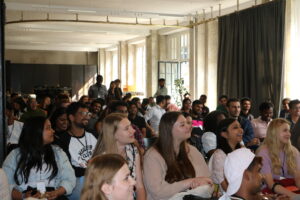Written by Aarushi Goel
MSc. International Business Management
DEGIS Head of the Network
The start of the 2025 Winter Semester marked one of the most ambitious volunteer recruitment seasons in DEGIS history. As international student numbers continued to rise across Germany, DEGIS set out with a clear mission: to expand its presence, strengthen leadership in every type of city, big, small, and everything in between, and build a truly connected nationwide network.
 This semester, DEGIS reached an active presence in over 60 cities, driven by volunteers committed to creating spaces where international students can survive, thrive, and vibe.
This semester, DEGIS reached an active presence in over 60 cities, driven by volunteers committed to creating spaces where international students can survive, thrive, and vibe.
Each city comes with its own challenges for international students and thus you can find tailored solutions as a DEGIS volunteer as well as provide them to your fellow international students.
Big Cities, Bigger Networks: Berlin, Munich, Stuttgart & Beyond
 Moving to a big German city sounds exciting, but many students quickly realize it can feel just as lonely as it is lively. Even though cities like Berlin, Munich, Stuttgart are full of events, opportunities, and endless things to do, it’s still hard to know where to begin. Students often arrive and feel lost in the crowd, unsure of where to meet others or how to build a real social circle. Do you feel the same?
Moving to a big German city sounds exciting, but many students quickly realize it can feel just as lonely as it is lively. Even though cities like Berlin, Munich, Stuttgart are full of events, opportunities, and endless things to do, it’s still hard to know where to begin. Students often arrive and feel lost in the crowd, unsure of where to meet others or how to build a real social circle. Do you feel the same?
DEGIS works to change that by creating warm, welcoming spaces where making friends doesn’t feel like another task on your to-do list. Through meetups, cultural celebrations, casual hangouts, and city explorations, students get a chance to settle in, meet people organically, and feel supported from their very first weeks. A big city can feel overwhelming, but with DEGIS, it becomes a place where students can thrive, not just survive
Small Cities, Big Ownership: Schmalkalden, Bonn, Magdeburg, Bochum
Small cities come with their own challenges. Students often say their city is quiet, that there aren’t many events, and that it’s hard to meet fellow internationals. Without the buzz of a metropolitan area, many feel disconnected from campus life and from each other.
 But small cities also have something powerful: the opportunity for students to take real ownership.
But small cities also have something powerful: the opportunity for students to take real ownership.
DEGIS chapters in these places often become tight-knit communities where students create their own activities, bring their cultures forward, and develop leadership skills along the way.
These chapters turn quiet cities into vibrant environments shaped by the students themselves. What they lack in size, they make up for with creativity, initiative, and community spirit.
The In-Between Challenge: Trier, Hof & Cities with Strong Universities but Limited Community Flow
Cities like Trier, Magdeburg and Hof have universities that offer helpful programs, cultural activities, and support systems. Yet many students still feel that their social life stays trapped inside the campus walls.
Even with good resources available, finding friends outside your faculty, connecting with students beyond your degree, or getting involved in wider initiatives can be difficult.
This is where DEGIS steps in by offering leadership roles, city-wide events, and intercity connections, DEGIS helps students break out of the campus bubble.
Students begin to interact across departments, collaborate with nearby chapters, and become part of a much wider national network. These chapters complement university offerings by opening doors to opportunities and friendships that go far beyond what campus alone can provide.
A Sustainable Network for the Future
Across all types of cities, DEGIS remains focused on building a long-lasting, supportive, and empowering network for international students. Volunteers aren’t just organizing events; they’re learning time management, leadership, teamwork, communication, and conflict resolution, essential skills that help them navigate both university and future careers.
Collaborations with international offices and external organizations strengthen this support system, giving students guidance and opportunities they might not have found on their own.
Students who stay active for two semesters receive certificates, exclusive webinars, and partner resources that recognize their growth, contribution, and dedication.
So come join DEGIS, where connections meet belonging and opportunities meet learning.




 My name is
My name is 


 Unfortunately, accommodation scams are a growing concern, especially on fast-moving platforms like Facebook, WG-Gesucht, and eBay Kleinanzeigen. These scams are often cleverly disguised, emotionally exhausting, and can lead to serious financial loss.
Unfortunately, accommodation scams are a growing concern, especially on fast-moving platforms like Facebook, WG-Gesucht, and eBay Kleinanzeigen. These scams are often cleverly disguised, emotionally exhausting, and can lead to serious financial loss. 


 Anmeldung is the official registration of your address in Germany, and it’s mandatory for anyone living here longer than a few months.
Anmeldung is the official registration of your address in Germany, and it’s mandatory for anyone living here longer than a few months.


 Celebrate Wins: Perhaps you passed a challenging German exam or landed a part-time job amid a busy schedule, it’s time to recognize your hard work!
Celebrate Wins: Perhaps you passed a challenging German exam or landed a part-time job amid a busy schedule, it’s time to recognize your hard work!



 A new year brings fresh possibilities that become tangible when we set precise, achievable goals and strengthen them with supportive daily habits.
A new year brings fresh possibilities that become tangible when we set precise, achievable goals and strengthen them with supportive daily habits. 

 Embarking on the adventure of permanently migrating to Germany and studying psychology in a German-taught program as an International Student had been a dream I held for almost a decade. My passion for immersing myself in a new culture began with my first student exchange experience in the Black Forest (Schwarzwald) region during high school.
Embarking on the adventure of permanently migrating to Germany and studying psychology in a German-taught program as an International Student had been a dream I held for almost a decade. My passion for immersing myself in a new culture began with my first student exchange experience in the Black Forest (Schwarzwald) region during high school. The first day at university felt like walking into a different world, starting just a few days after my arrival with a new home and jetlag on top! Surrounded by new faces and engaging in complex conversations entirely in German, I was both excited and challenged by the opportunity to fully immerse myself in the language and culture. Although I held a C1 level in German, the fast-paced lectures and nuanced academic discussions initially felt daunting. I remember sitting in the lecture hall about to hold my first presentation, and I was shaking in my boots!
The first day at university felt like walking into a different world, starting just a few days after my arrival with a new home and jetlag on top! Surrounded by new faces and engaging in complex conversations entirely in German, I was both excited and challenged by the opportunity to fully immerse myself in the language and culture. Although I held a C1 level in German, the fast-paced lectures and nuanced academic discussions initially felt daunting. I remember sitting in the lecture hall about to hold my first presentation, and I was shaking in my boots! In my quest to find a sense of community who actually understood and could relate to my personal journey, I discovered
In my quest to find a sense of community who actually understood and could relate to my personal journey, I discovered Furthermore, I sought ways to enhance my German beyond the C1 level. I immersed myself in the language by attending local meetups with other language learners, speaking as much German as possible with my fellow native speaker students, reading German literature and diving into German news on politics and cultural happenings. If you want some cool tips on German language resources,
Furthermore, I sought ways to enhance my German beyond the C1 level. I immersed myself in the language by attending local meetups with other language learners, speaking as much German as possible with my fellow native speaker students, reading German literature and diving into German news on politics and cultural happenings. If you want some cool tips on German language resources,  Above all, taking action in your new life in Germany without hesitation is key!
Above all, taking action in your new life in Germany without hesitation is key!
